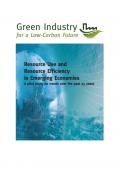This monograph presents a critical review of carbon trading in Africa. It comprises a compendium of essays by an expert group of authors, each analysing key issues from a corruption and governance perspective. The chapters include a discussion on the context of and trends in the carbon market in Africa, offset projects in Uganda, Ethiopia and South Africa, carbon finance and regulation. The authors explore issues around transparency and accountability, and examine the integrity of systems and processes aimed at achieving professed goals of climate change mitigation and sustainable development. While deficits in transparency and accountability do not necessarily constitute corruption, they are nevertheless seen as cause for concern as they provide opportunities for corrupt activities to take place. In general, corruption is approached in a nuanced way because carbon trading provides new and different ways of profiting illegitimately at the expense of a deteriorating climate. For this reason, the study adopts a broad definition of corruption, sometimes using it to indicate a particular or singular abuse, and sometimes to refer to systemic challenges.
This document is a review of the low carbon growth studies conducted in six emerging economies: Brazil, China, India, Indonesia, Mexico and South Africa. These countries, with the help of the Energy Sector Management Assistance Programme (ESMAP), have initiated country specific studies to assess development goals in conjunction with greenhouse gas mitigation opportunities. The aim is to present a framework for other countries who wish to implement studies of their own.
The paper is structured to mirror the seven step process of establishing a low carbon growth country study.
This publication, by UNEP, aims to identify the challenges faced in attempting to decouple human well‐being from resource consumption and exists as the first report amongst many investigations into decoupling which will be undertaken by the International Resource Panel and UNEP over the next few years. The report offers facts and statistics of natural resource flows and trade globally and notes that consumption of natural resources is still rapidly rising. A series of country wide case studies (Germany, South Africa, China and Japan) are presented that examine the decoupling potential of the countries in question. The report observes that developed countries appear to show stabilisation of resource and energy consumption however these economies appear to have exported the more energy and resource intensive elements elsewhere. There appears to be some success of relative decoupling (where resource intensity per unit growth falls) in developing countries but resource consumption in these economies is ‘steeply on the rise’.

This report examines patterns and trends in resource use and resource efficiency in 16 selected emerging economies between 1985 and 2005. In order to facilitate comparison, the authors divided these countries into three different groups according to their dominant strategy of economic development since 1985: resource-based economies with a high ratio of raw materials in exports, including Algeria, Argentina, Brazil, Chile, Morocco, Russia and South Africa; industry-based economies which have been expanding their capacity to produce manufactured goods and related services, including China, Costa Rica, Malaysia, Mexico and the Republic of Korea; and services-based economies that have largely based their development since 1985 on services (e.g. tourism, financial or knowledge-based industries), including Barbados, Egypt, India and the Seychelles. While none of these three development paths is exclusive, they are useful categories for analytical purposes, as each is linked to specific physical or material profiles in terms of resource use and resource productivity.
